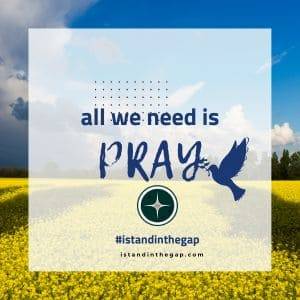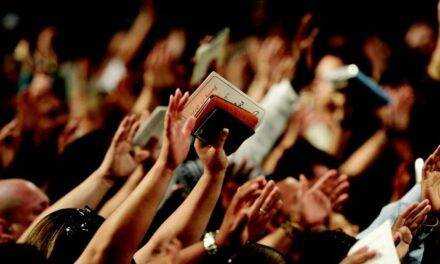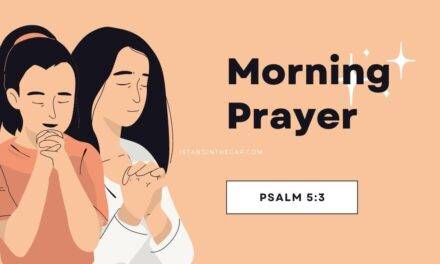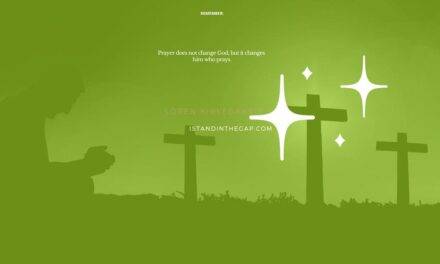To the Christian, prayer and intercession are two powerful spiritual disciplines that have the potential to bring about significant change in our lives and in the world around us. The fact is, we are called to pray continually and to intercede on behalf of others, standing in the gap and seeking God’s mercy and intervention.
At istandinthegap.com, our message is one of hope and encouragement, inviting believers to stand in the gap and make a difference through prayer and intercession. Our inspiration comes from the words of the prophet Ezekiel, who spoke of the need for intercessors to stand in the gap and plead for mercy on behalf of sinful and rebellious people.
In this article, apart from the content of the title, we will look at practical ways to apply these principles in our lives. Join us as we delve deeper into the call to intercede and the power of standing in the gap.
Anchor verse for the significance of Ezekiel 22:30 for prayer, intercession, and standing in the gap
In Ezekiel, God says:
I sought for a man among them who would build up the hedge and stand in the gap before Me for the land so that I would not destroy it, but I found no one.
Ezekiel 22:30 (MEV)

These words convey a powerful message of the importance of interceeding and standing in the gap, reminding us of our responsibility to intercede for our communities and the world.
Details to Prayer and Intercession, and Standing in the Gap
I. Understanding Prayer and Intercession
These terms are two essential disciplines for every believer in Christ and are often used interchangeably, but they have distinct meanings and applications. Prayer is the act of communicating with God, while intercession is the act of praying on behalf of others.
The Bible provides a strong foundation for both terms. We see examples of them throughout the Old and New Testaments, from the prayers of Abraham, Moses, and David to the that of Jesus and the apostles.
The Bible teaches us that both are not just optional activities, but rather essential aspects of our walk with God.
- In James 5:16, we are told to “pray for each other so that you may be healed. The prayer of a righteous person is powerful and effective.”
- Similarly, in 1 Timothy 2:1, we are urged to “pray for all people. Ask God to help them; intercede on their behalf, and give thanks for them.”
These verses highlight the importance of interceding for others, recognizing that when we kneel down before God, it has the power to bring about healing, deliverance, and transformation.
At istandinthegap.com, our message is one of standing in the gap and interceding on behalf of our communities and the world. We believe that it is a powerful tool for bringing about change and transformation. When we pray and intercede, we are partnering with God to bring His kingdom to earth.
II. Standing in the Gap: What It Means and Why It Matters
a. What does “standing in the gap” means?
To stand in the gap means to intercede on behalf of others or to fill a need in a given situation. In a literal sense, standing in the gap can refer to the act of physically occupying a space or taking a position to protect or defend others.
In a spiritual sense, standing in the gap means praying and interceding on behalf of others, whether it be for their salvation, healing, or other needs.
Throughout the Bible, intercessory prayer examples of individuals who stood in the gap.
- One notable example is Abraham interceding for Sodom and Gomorrah in Genesis 18:16-33. When God planned to destroy the cities due to their wickedness, Abraham pleaded with God to spare them if there were even just ten righteous people found in the cities.
- Another example is Moses interceding for the Israelites in Exodus 32:11-14 when they had sinned against God by creating and worshiping a golden calf. Moses pleaded with God to have mercy on the people and not destroy them.
- The ultimate example of standing in the gap is Jesus Christ, who stood in the gap between God and humanity on the cross.
In 1 Timothy, we read:
5 There is one God and one mediator between God and men, the Man Christ Jesus, 6 who gave Himself as a ransom for all. This was the testimony given at the proper time.
1 Timothy 2:5-6 (MEV)
Jesus interceded on our behalf and took our place on the cross, bridging the gap between us and God. By the simple prayers of intercession many were saved.
b. Why is standing in the gap important?
The world we live in is broken and marred by sin, and as a result, there are many needs that must be addressed.
Standing in the gap is important because it allows us to intercede on behalf of others and meet those needs. In Ezekiel 22:30, God laments that He could not find anyone to stand in the gap and intercede on behalf of the land.
This highlights the importance of standing in the gap and the role that the Church and all believers have in interceding for our communities and the world.
See, all believers are called to be agents of change and transformation in the world. Standing in the gap is one way that we can do this.
In Isaiah, we read:
6 Is not this the fast that I have chosen: to loose the bonds of wickedness, to undo the heavy burdens, and to let the oppressed go free, and break every yoke? 7 Is it not to divide your bread with the hungry and bring the poor who are outcasts into your house? When you see the naked, to cover him and not hide yourself from your own flesh?
Isaiah 58:6-7 (MEV)
The above passage means standing in the gap allows us to address the needs of the world and bring about healing, justice, goodness, and transformation.
c. How does standing in the gap relates to prayer and intercession, and how it can impact our communities and the world?
Standing in the gap is intimately connected to prayer and intercession. In fact, praying and interceding on behalf of others are essential components of standing in the gap. Through prayer, we can intercede on behalf of others and bring their needs before God.
The apostle Paul says:
Pray in the Spirit always with all kinds of prayer and supplication. To that end be alert with all perseverance and supplication for all the saints.
Ephesians 6:18 (MEV)
Standing in the gap involves interceding on behalf of others, which is closely related to prayer.

In the Bible, praying and interceding were powerful tools used to bring about change and transformation. In Exodus 32:9-14, we see how Moses interceded on behalf of the Israelites when God was ready to destroy them for their disobedience. Similarly, in 2 Chronicles 7:14, God calls on His people to humble themselves, pray, seek His face, and turn from their wicked ways, promising to heal their land in return.
When we stand in the gap by praying and interceding, we are positioning ourselves as agents of divine change in our communities and the world. We are lifting up the needs of others to our Father and asking for His divine intervention and guidance. As a result of such efforts, we can see healing, reconciliation, justice, and other positive changes take place.
Moreover, standing in the gap can help us develop a heart of love for others and cultivate empathy and compassion. By so doing, we will see the world from their perspective and understand the struggles they face, which can motivate us to take action and make a difference in their lives, thereby becoming a force for good and bringing light into a dark world.
III. The Significance of Ezekiel 22:30
a. It is a powerful verse that provides insight into God’s heart for His people.
b. It speaks to the importance of standing in the gap, which involves interceding on behalf of others and seeking God’s mercy and protection for them. It also shows that God desires to work through his people to bring about his will on earth.
c. Its significance for Christians today is that it calls us to be prayer warriors and intercessors, actively seeking God’s guidance and protection for our communities and the world. It reminds us that we have a responsibility to occupy the gap and pray for those who are in need, whether they are friends, family, or strangers.
As believers, we are called to be the hands and feet of Christ, and by praying we are able to do exactly that.
V. Practical Tips for Praying and Interceding
Standing in the gap can sometimes feel overwhelming, but with a few practical tips, anyone can develop a powerful prayer life that impacts their world.
a. Practical Tips for Praying and Interceding Effectively:
- Set aside regular time for prayer: Just as with any important task, it’s important to make it a priority by scheduling it in your day.
- Pray with intention: Rather than just going through a list of requests, take time to focus on each person or situation and pray specifically for their needs.
- Use the Bible as a guide: Praying scripture can help us align our prayers with God’s will and can also provide encouragement and inspiration.
- Pray in the community: Praying with others can provide accountability, and encouragement, and can increase the power of our prayers.
- Be persistent: Sometimes our prayers are not answered immediately, but persistence and faith can move mountains.
b. How these tips can help us to make a difference:
When we pray and intercede with intention and persistence, we can make a significant impact on our communities and the world around us. By following these practical tips, we can develop a powerful prayer life that impacts those around us.
c. Resources and tools for those who want to learn more
For those who want to learn more about it, there are many resources and tools available. Some suggestions include reading books on prayer, attending prayer conferences, joining a prayer group or network, and using apps and devotionals.
Websites like istandinthegap.com also offer resources and tools for those looking to grow in the faith.
Frequently asked questions
What does “standing in the gap” mean in the context of Ezekiel 22:30?
“Standing in the gap” refers to interceding or standing between God and a sinful nation to ask for God’s mercy and forgiveness.
The prophet Ezekiel was called to rebuke the sins of the Israelites and to call them to repentance. However, he found that there was no one who was willing to stand in the gap and intercede for the nation before God.
Therefore, he lamented in Ezekiel 22:30, “I looked for someone among them who would build up the wall and stand before me in the gap on behalf of the land so I would not have to destroy it, but I found no one.”
How can we practically apply the message of Ezekiel 22:30 in our prayer and intercession lives?
We can practically apply the message by regularly praying and interceding for those in need, and by being willing to be a mediator between God and others. This can involve confessing the sins of our community or nation, praying for the salvation of others, and standing in the gap for those who are marginalized or oppressed.
We can also seek God’s guidance and wisdom in discerning where we are called to stand in the gap and intercede on behalf of others.
Finally, we can make a commitment to live a life of praying and interceding, seeking to grow in our relationship with God and our ability to hear His voice and respond to His leading.
Why is intercession important in the context of standing in the gap?
It is important because it involves standing in the gap for others. Interceding is a form of prayer where we pray on behalf of others, bringing their needs before God and asking for His intervention in their lives.
By interceding for others, we are standing in the gap for them, bridging the gap between their needs and God’s provision. Through this, we can help others to receive God’s blessings and to experience His love and grace.
How can we know if we are called to stand in the gap for a specific situation or people group?
Discerning if we are called to stand in the gap for a specific situation or a people requires seeking God’s guidance through prayer and discernment. It is important to listen to the promptings of the Holy Spirit and pay attention to any burdens or feelings of conviction that we may experience.
Additionally, seeking wise counsel from trusted spiritual mentors and leaders can help confirm and clarify a sense of calling. Ultimately, it is important to be obedient to God’s leading and trust that He will use your prayer and intercession for His purposes.
What are some practical ways that standing in the gap through prayer and intercession can impact our communities and the world?
a. Bringing about spiritual breakthrough: Prayer and intercession can lead to spiritual breakthroughs, which can result in positive changes in people’s lives and in the community as a whole.
b. Providing protection: When we stand in the gap through prayer and intercession, we can provide protection for our communities and loved ones against harm and evil.
c. Bringing healing: Our prayers can bring healing and restoration to those who are hurting, sick, or in need.
d. Building unity: Praying and interceding together can help to build unity and strengthen relationships within the community.
e. Bringing transformation: As we pray and intercede for our communities and the world, we can ask God to bring about transformation and positive change in the lives of individuals and the community as a whole.
What does intercession mean in prayer?
Intercession in prayer is the act of praying on behalf of someone else. It is the practice of bringing the needs and concerns of others before God, often with a sense of urgency and compassion. It involves standing in the gap for others, asking God to intervene in their lives, and seeking his guidance and provision on their behalf.
Intercessory prayer is an important aspect of the Christian faith and is believed to have the power to bring about transformation in the lives of individuals, communities, and nations.
Conclusion to the Significance of Ezekiel 22:30 for Prayer, Intercession, and Standing in the Gap
It can be concluded that prayer and intercession play a crucial role in our relationship with God and our impact on the world. Standing in the gap is a powerful act that can make a significant difference in our communities and beyond.
In this work, we have explored the biblical basis and practical tips for effective prayer and intercession, as well as the significance of Ezekiel 22:30 in inspiring us to stand in the gap.
It is our hope that this article has encouraged and equipped you to deepen your prayer life and intercede for those around you. I encourage you to put what you have learned into practice and make a difference in your world through prayer and intercession.
For more resources and tools on prayer, intercession, and standing in the gap, please visit istandinthegap.com. Let us continue to pray and intercede together for the transformation of our communities and the world.



















I have to thank you for the efforts you’ve put into writing this blog. I’m hoping to check out the same high-grade blog posts by you later on as well. In fact, your creative writing abilities have encouraged me to get my own website now 😉